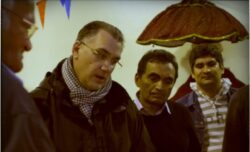A Day all about Mel Prideaux and the Community Religions Project

- Date: Friday 6 December 2024, 10:30 – 15:30
- Location: University of Leeds
- Cost: Free
On the occasion of Mel leaving us soon, there will be a day of reflection and celebration focused on the Community Religions Project, which Mel has directed in recent years
Professor Melanie Prideaux has been a key member, shaper, and supporter of the Centre for Religion and Public Life (CRPL) over many, many years. Mel’s academic interests have spanned interfaith dialogue, Muslim-Christian relations, religion and public life, and fieldwork methodologies and practices. During her time at Leeds, she has been an inspirational educator, supervisor, and colleague, pioneering innovative teaching strategies and doing much to facilitate and nurture constructive and productive working relationships between students and academic staff, and between them and diverse religious communities in Leeds.
On the occasion of Mel leaving us soon, there will be a day of reflection and celebration focused on the Community Religions Project, which Mel has directed in recent years. Mel has made significant positive impact on CRPL and the School of Philosophy, Religion and History of Science and will be much missed. Please join us on 6 December 2024. Save the date (more details below and to follow).
From Mel…
The Community Religions Project (CRP) has been a key dimension of my time at Leeds as both a student (MA and PhD) and an academic. The CRP has shaped my research and my teaching, and in the last ten years I have, to some extent, shaped it. As Director of the CRP, I have focussed on learning and teaching – with our website (completed in 2015 by Jo Henderson-Merrygold as part of a student internship) providing a showcase for student research and projects. As I leave the University, the time is right to consider both the legacy and the future of the CRP.
The CRP was formed in 1976, originally as an informal research group led by Michael Pye, Ursula King, and William Weaver. Kim Knott was the long-term Director of the CRP and is probably the noted academic most associated with its development. Her own research, and the modules which she developed, have left a lasting impact on the study of religion in Leeds. The original purpose of the CRP was, according to Pye:
… to carry out and publish research into the religious communities of Leeds and neighbouring cities, and to relate such research to associated matters such as community relations, inter-religious understanding, religious education, and teaching programmes within the University.
In my 2008 PhD, available here, I noted that the CRP had led to my ‘inclination toward local, small scale, contemporary, ethnographic studies that are comfortable in interaction with theology and cognisant of the public policy debates surrounding ethnicity and religion’ (p.25). Our current PhD students and others in the Centre for Religion and Public Life (CRPL) are often adopting exactly this approach, and looking at the themes Pye suggests, though perhaps with less awareness of the ‘academic family tree’ which has made Leeds such a friendly space for such studies.
The extent of the research produced which has been actively associated with the CRP is visible in the range of subjects covered in the CRP monograph series (1984-1999), and in our archive of policy reports (1998-2016) which can be found in our research archive https://crp.leeds.ac.uk/research-archive/. Many more (and more recent) studies could doubtless be added to this archive – perhaps you might suggest some?
Changes in the curriculum mean that once ‘core’ features of the TRS degree at Leeds (largely developed by Kim Knott) have changed. The Religious Mapping of Leeds was a Level 3 module which is still a model of authentic and engaged student research and assessment – with teams of students researching local communities and presenting their findings back to the local community. One of the most memorable was the Mapping of Chapeltown, where a senior police officer rather put the students on the spot by asking ‘So what should I do with this research?’. Of course, they replied with authority and enthusiasm! Religion in Modern Britain is a Level 1 module which is now optional but was originally compulsory – with all new Theology and Religious Studies students at Leeds required to undertake independent fieldwork in the locality. Many of our graduates (including current PhD students) remember this as a formative experience. I certainly remember the wonderful accounts including of a football match at Elland Road (‘Is football a religion?’). Indeed, for many years I would consider these reports one of my key ways of finding out what was happening in the religious life of Leeds!

From the CRP archive, depicting Sean McLoughlin (wearing scarf)
What next then for the CRP? This is the focus of our study day on December 6th. Between 10:30 am and 3:30 pm we will hear from academics, graduates and current PhD students as well, I’m very excited to say, from Kim Knott herself. We’ll hear about their research and their reflections on the CRP, and we will have some time in the afternoon to consider what the future of the CRP might look like, as I hand the directorship over into the capable hands of Emma Tomalin.
If you would like to attend, please email me (m.j.prideaux@leeds.ac.uk) noting any dietary and access requirements, and I will send through the joining instructions and programme for the day.
Knott, K. (2004). ‘The Sense and Nonsense of “Community” A Consideration of Contemporary Debates about Community and Culture by a Scholar of Religion.’ In S.J. Sutcliffe (ed.), Religion: Empirical Studies (pp. 67-90). Aldershot: Ashgate Publishing Limited, p.68.

